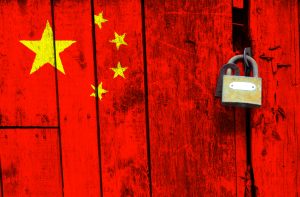Chinese censors are trying to prevent people from viewing posts that allege severe environmental damage in Tibet caused by sand mining.
A young Tibetan man named Tsowo Tsering initiated the online discussion with a video post, delivered in Mandarin. In it, he says he is speaking from Ngawa Tibetan Autonomous Prefecture, in southwest China’s Sichuan Province.
He shares video footage that he says proves the severe impact of activities by a Chinese mining company on his community. Tsowo Tsering claims that “large amounts of sand have been recklessly mined, leading to serious soil erosion in the surrounding areas. This endangers the foundations of residents’ homes.”
Tsering alleges that Anhui Xianhe Construction Engineering Company has been conducting large-scale sand extraction in the region since May 2023, under the pretense of road construction. Tsering states that the local Ecological Protection Bureau acknowledged the illegality of the mining operations but imposed only token penalties, allowing the destructive activities to continue.
The video has now been purged from Chinese platforms, but has been translated and transcribed on the website of Free Tibet.
The video focuses on the Tsaruma River, a tributary of the sources of Yangtze and Yellow Rivers. Tsowo Tsering says: “We have lived and flourished on this land for generations. The quality of the ecological environment concerns the health and life safety of our descendants.”
He warns that over time, environmental damage will become increasingly severe. “The consequences will be beyond imagination. When environmental damage reaches a certain level, the collapse of the ecosystem will be an irreversible disaster,” says Tsering.
Within days of its posting, Chinese authorities not only removed the video but also shut down Tsering’s account and blocked all search terms related to his name on WeChat.
Free Tibet’s Advocacy Officer Tenzin Kunga told The Diplomat that Tibetans, as stewards of their homeland, have a duty to raise urgent concerns over environmental destruction.
“Chinese construction companies, in collusion with local authorities, exploit Tibet’s land without accountability,” said Kunga
“Brave Tibetan environmentalists, like Tsowo Tsering, risk their safety in speaking out, as authorities often imprison them under the guise of ‘inciting separatism.’ I fear Tsering may face the same fate as Tibetan community leader A-Nya Sengdra, who is in prison for his activism.”
The Tibetan government-in-exile based in India is frequently critical of what it sees as China’s irresponsible attitude toward the environment.
There is particular concern over the process of the extraction of natural resources, which may cause water pollution. Tibet’s rivers and glaciers are internationally important. Water that originates on the Tibetan plateau supplies vast swathes of Asia, including many millions of people in China and India.
Online protests by local people are extremely rare. They are also difficult to verify, as China strictly tries to control the narrative around its administration of Tibet.
Foreign reporters are rarely allowed into Tibet, least of all to cover sensitive environmental issues. The official Chinese media always present the development of Tibet as being a boon for local people, and associate it with a journey from feudalism to modernization, under the auspices of the Chinese Communist Party.

































